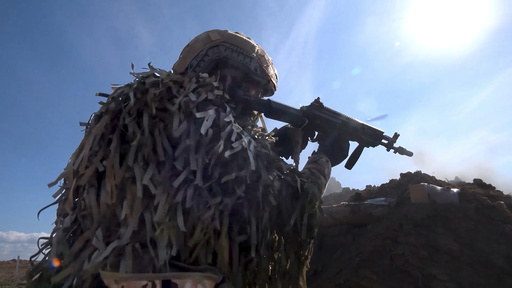
KYIV, Ukraine — On Monday, Germany’s Foreign Minister Annalena Baerbock made an unexpected visit to the Ukrainian capital, Kyiv, signaling continued European support for Ukraine amidst an impending U.S. presidential election that could lead to significant shifts in Washington’s approach to Russia’s ongoing invasion of Ukraine.
Germany stands as Ukraine’s second-largest supplier of military aid following the U.S., and Baerbock reaffirmed Berlin’s commitment. She stated, as reported by the German news agency dpa, “Germany stands firmly by Ukraine’s side along with many partners globally. We will assist the Ukrainian people for as long as necessary on their journey towards a just peace.”
The conflict has entered a pivotal phase for Ukraine, highlighted by the Russian military making gradual advances on various fronts and the prospect of a harsh winter looming ahead, particularly after Russia’s consistent assaults on the Ukrainian energy infrastructure.
In the lead-up to the U.S. elections, Ukrainian President Volodymyr Zelenskyy sought to solidify Ukraine’s position with Western allies through a long-term “victory plan.” This plan included formal NATO membership for Ukraine and the authorization to utilize Western long-range missiles against military objectives within Russia. However, the reception from Kyiv’s allies was less encouraging than expected.
Russia is applying pressure with its numerical superiority on the battlefield. General Oleksandr Syrskyi, Ukraine’s top military commander, shared over the weekend that Ukrainian forces are facing challenges in repelling “one of the most powerful Russian offensives” witnessed during the ongoing conflict.
Adding to the complexities, it has been reported by Western intelligence agencies that approximately 10,000 North Korean combat troops have been dispatched to bolster Russia’s military efforts under a recent agreement with Pyongyang. This development has intensified Zelenskyy’s discontent with the pace of assistance from Western nations. He implored allies on Saturday to move beyond mere observation and take proactive measures before these North Korean soldiers engage in combat.
Zelenskyy noted that Ukraine has intelligence regarding the Russian training camps for the North Korean troops. However, the Ukrainian forces require approval from their allies to deploy Western long-range weaponry to target those camps located deep within Russia.
Baerbock’s arrival in Kyiv coincided with reports of drones being intercepted by air defenses, resulting in debris falling across two districts in the city, which caused small fires but fortunately did not result in any injuries. According to Serhii Popko, the head of the Kyiv city administration, no casualties were reported.
In a separate incident, a Russian glide bomb attack on Sunday night in Kharkiv, Ukraine’s second-largest city in the northeast, injured 15 individuals, according to local police reports. During the night, the Ukrainian air force indicated that Russia launched around 80 Shahed drones at various cities across Ukraine.
